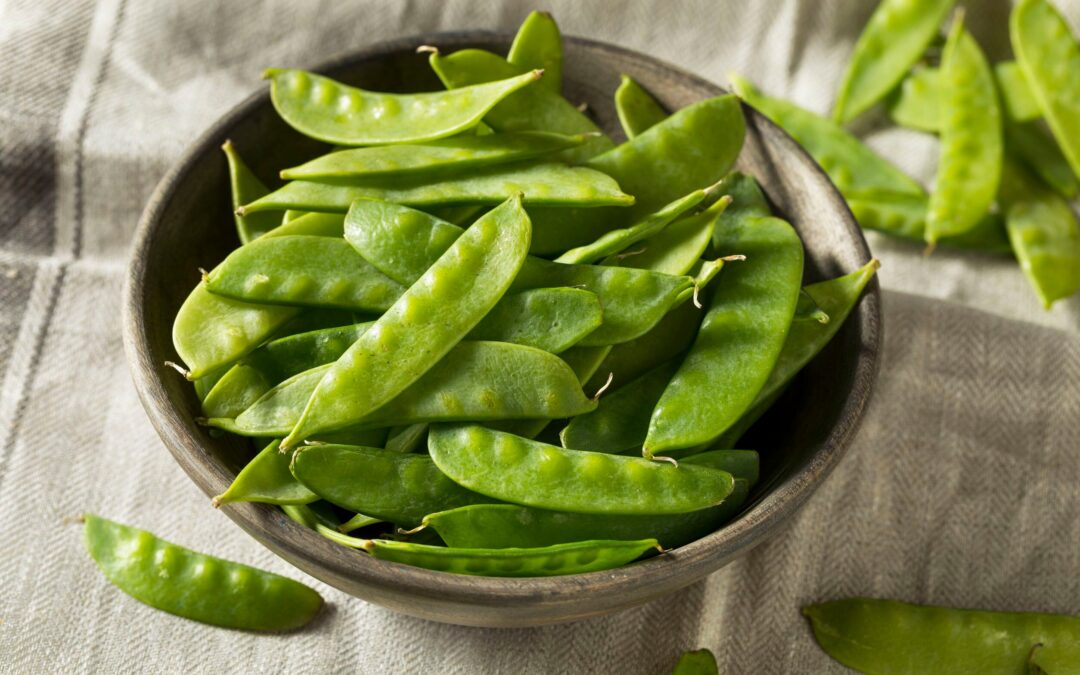Snow Pea
The snow pea, also known as the sugar snap pea or Chinese pea pod, is a variety of pea that is cultivated for its edible pea pods. Scientifically known as Pisum sativum var. macrocarpon, snow peas are characterized by flat, thin pods with barely developed peas inside. The entire pod is edible, and it is often used in various culinary dishes.
Snow peas are commonly used in stir-fries, salads, and other Asian-inspired dishes. They add a crisp and sweet flavor to recipes and are known for their tender texture. The name “snow pea” is derived from the pea’s tendency to thrive in cooler temperatures, often associating with the snowy conditions of winter.
When selecting snow peas, look for pods that are bright green, crisp, and free from blemishes. They are best enjoyed fresh, as their sweetness and crunch diminish over time. To prepare snow peas, you can simply trim the ends and remove any tough strings along the seams before incorporating them into your chosen recipe.
Snow Pea Meaning in Urdu:
In Urdu, snow pea is referred to as “برفی مٹر” (Barfi Matar). The name reflects the pea’s association with winter and snowy conditions.
Snow Peas Recipe
Ingredients:
1 pound (about 450g) snow peas
2 tablespoons olive oil
2 cloves garlic, minced
Salt and pepper to taste
Instructions:
Wash and trim the ends of the snow peas.
Heat olive oil in a pan over medium heat.
Sauté minced garlic for about 1 minute until fragrant.
Add snow peas to the pan and sauté for 2-3 minutes until bright green and slightly tender.
Season with salt and pepper.
Remove from heat and serve immediately.
Snow Peas Nutrition:
Snow peas are not only delicious but also nutritious. They are low in calories and high in essential nutrients, making them a healthy addition to your diet. A 1-cup (160g) serving of snow peas typically provides:
Calories: 67
Protein: 4.2g
Dietary Fiber: 2.6g
Vitamin C: 95% of the daily recommended intake
Vitamin A: 19% of the daily recommended intake
Iron: 11% of the daily recommended intake
Key Health Benefits of Snow Peas:
Rich in Vitamins: Snow peas are a great source of vitamin C, which supports the immune system and skin health. They also contain vitamin A, important for vision and immune function.
Fiber Content: The dietary fiber in snow peas contributes to digestive health, helps maintain a healthy weight, and regulates blood sugar levels.
Antioxidant Properties: Snow peas contain antioxidants that help combat oxidative stress in the body, reducing the risk of chronic diseases.
Low in Calories: With their low-calorie content, snow peas are an excellent option for those looking to manage their weight while still enjoying a tasty and nutritious vegetable.
Incorporating Snow Peas into Your Diet:
Stir-Fries: Add snow peas to your favorite stir-fry for a crunchy and vibrant addition.
Salads: Toss blanched snow peas into salads to enhance both flavor and nutritional content.
Snacking: Enjoy snow peas as a nutritious snack, either raw or lightly blanched.
Conclusion: Snow peas, with their crisp texture and sweet flavor, are not only a delightful addition to various dishes but also offer a range of health benefits. Whether you’re seeking a tasty recipe or aiming to boost your nutrient intake, snow peas are a versatile and nutritious choice. Consider incorporating them into your meals for a delicious and healthful dining experience.
Snow Peas Taste:
Snow peas have a mild, sweet flavor and a crisp, crunchy texture. The entire pod is edible, and it provides a refreshing and juicy bite. The taste is often described as slightly grassy and sweet, making them a popular addition to various dishes, especially in stir-fries, salads, and side dishes. Their tender texture makes them a delightful and versatile vegetable in both raw and cooked forms.

Snow Peas Benefits:
Nutrient-Rich: Snow peas are a good source of vitamins, particularly vitamin C and vitamin A. These vitamins contribute to immune function, skin health, and vision.
Dietary Fiber: The dietary fiber content in snow peas supports digestive health, helps maintain a healthy weight, and regulates blood sugar levels.
Low in Calories: With their low-calorie content, snow peas are a nutritious option for those aiming to manage their calorie intake while enjoying a tasty vegetable.
Antioxidant Properties: Snow peas contain antioxidants that help combat oxidative stress in the body, potentially reducing the risk of chronic diseases.
Rich in Minerals: Snow peas provide essential minerals such as iron, which is important for oxygen transport in the blood.
Snow Peas Scientific Name:
The scientific name for snow peas is Pisum sativum var. macrocarpon. This variety of pea is specifically cultivated for its edible pods.
Snow Pea Flower:
Snow pea plants produce delicate white flowers before the pods develop. The flowers are typically small and pea-like in appearance. They play a crucial role in the plant’s reproductive process, eventually leading to the formation of the edible pods that we harvest.
Snow Pea Seeds:
The seeds of snow peas are the peas themselves, found within the pods. These seeds are usually small and underdeveloped compared to garden peas because the primary focus in snow pea cultivation is on the tender, flat pods. However, the seeds are still edible, and some may enjoy them along with the pod, while others prefer to remove them before consumption.
In summary, snow peas offer a delightful taste, are rich in nutrients, and their scientific name is Pisum sativum var. macrocarpon. The delicate flowers precede the development of the edible pods, and the small seeds within the pods are also edible. Incorporating snow peas into your diet can contribute both to your palate and your overall nutritional well-being.
Vitamins in Snow Peas:
Snow peas are a good source of various vitamins, including:
Vitamin C: An antioxidant that supports the immune system and skin health.
Vitamin A: Essential for vision, immune function, and skin health.
Vitamin K: Important for blood clotting and bone health.
Folate (Vitamin B9): Vital for cell division and the formation of DNA.
Protein in Snow Peas:
While snow peas are not particularly high in protein compared to other legumes, they still contribute to your protein intake. A 1-cup (160g) serving of snow peas typically contains around 4.2 grams of protein.
Calories in Snow Peas:
Snow peas are low in calories, making them a great option for those looking to manage their calorie intake. A 1-cup (160g) serving of snow peas typically contains around 67 calories.
Benefits for Babies:
Snow peas can be a nutritious addition to a baby’s diet when introduced at an appropriate age. They provide essential vitamins and minerals crucial for growth and development.
Ensure that snow peas are cooked until they are very tender or pureed for younger babies to prevent choking hazards.
Introduce new foods one at a time and monitor for any potential allergic reactions.
Health Benefits of Snow Peas:
Dietary Fiber: Snow peas are a good source of dietary fiber, promoting digestive health and helping with weight management.
Antioxidants: The presence of antioxidants in snow peas helps combat oxidative stress, reducing the risk of chronic diseases.
Low-Calorie Option: Snow peas are a nutritious, low-calorie vegetable, making them a healthy choice for those watching their calorie intake.
Iron Content: Snow peas contain iron, which is essential for oxygen transport in the blood.
Ways to Incorporate Snow Peas into a Healthy Diet:
Snacking: Enjoy raw snow peas as a crunchy and healthy snack.
Stir-Fries: Add snow peas to stir-fries for a burst of color, flavor, and nutrition.
Salads: Toss blanched snow peas into salads to enhance both texture and nutritional content.
In summary, snow peas are a nutritious vegetable that provides vitamins, a moderate amount of protein, and is low in calories. They can be a healthy addition to a baby’s diet when introduced at the appropriate age and offer various health benefits for individuals of all ages.

Advantages of Snow Peas:
Nutrient-Rich: Snow peas are rich in essential nutrients, including vitamins A and C, dietary fiber, and minerals like iron. These nutrients contribute to overall health and well-being.
Low in Calories: Snow peas are a low-calorie vegetable, making them a suitable choice for those looking to maintain or lose weight while still enjoying a flavorful and nutritious food.
Antioxidant Properties: The presence of antioxidants in snow peas helps combat oxidative stress, which is beneficial for reducing the risk of chronic diseases and supporting overall health.
Versatility in Cooking: Snow peas are versatile in the kitchen and can be used in a variety of dishes, including stir-fries, salads, and side dishes. Their mild flavor and crisp texture make them a favorite ingredient in many recipes.
Dietary Fiber: The dietary fiber in snow peas promotes digestive health, helps maintain a healthy weight, and regulates blood sugar levels.
Disadvantages of Snow Peas:
Potential Choking Hazard: The string along the seam of the snow pea pod can be tough, and the pod itself may pose a choking hazard, especially for young children. Ensure that snow peas are prepared appropriately, with strings removed and pods cut into smaller, manageable pieces.
Flat Flavor: While many people enjoy the mild and slightly sweet flavor of snow peas, some may find them lacking in the robust taste found in other vegetables.
Sensitive to Overcooking: Overcooking snow peas can result in a loss of their crisp texture and vibrant color. It’s important to cook them briefly to maintain their appealing characteristics.
Snow Pea Chips:
Snow pea chips are a creative and healthy alternative to traditional potato chips. They are typically made by thinly slicing snow peas, seasoning them, and then baking or dehydrating until crisp. This snack retains the nutritional benefits of snow peas while providing a crunchy and flavorful option. Homemade snow pea chips can be a tasty and nutritious treat for those looking for a satisfying snack with fewer calories than traditional potato chips.
In summary, snow peas offer numerous advantages as a nutrient-rich, low-calorie vegetable with antioxidant properties. However, it’s essential to be aware of potential choking hazards and to avoid overcooking. Additionally, snow pea chips provide a creative and healthy alternative to traditional snacks.

